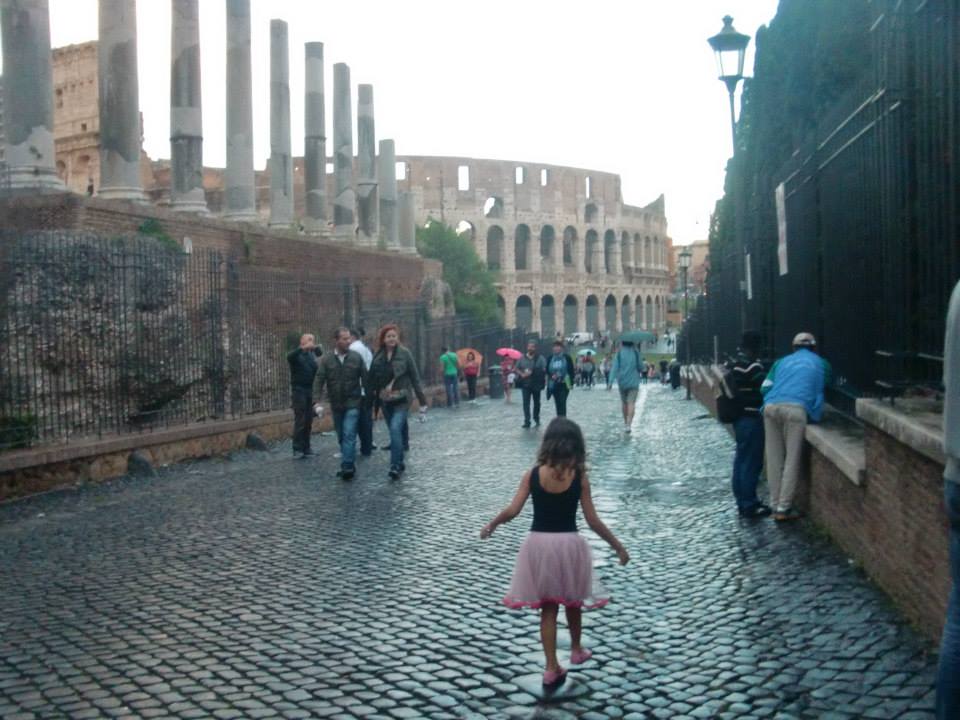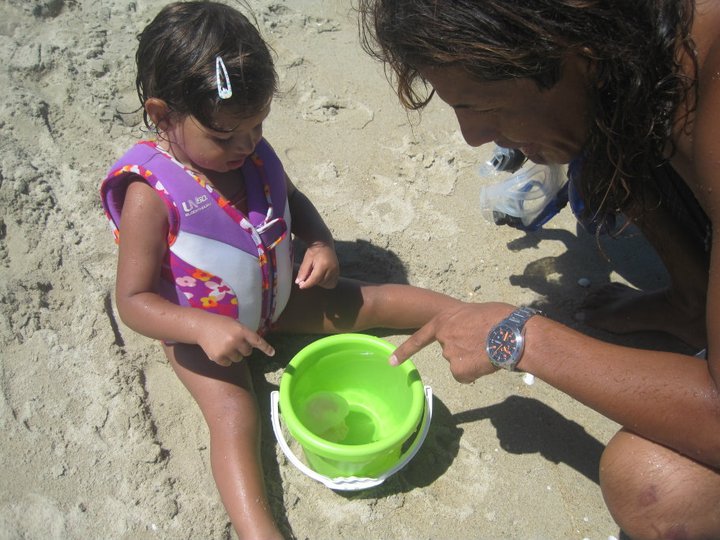
Worldschooling Defined
When I first considered homeschooling as an option for Tina I was voracious in my research to discover which approach we should use. I was overwhelmed for several months because the number of choices and available resources are staggering. It didn’t take me long to determine that there was no one, *right* approach for my family.
Some approaches were obviously not a good fit. Pre-packaged curriculum? Nope. Can’t bring those around the world in one suitcase. Christian-based? No thanks. We are agnostic. Computer-based? Maybe later on, but not when Tina is little.
Then I met a lovely French family on the beach in Hoi An, Vietnam. They were in the midst of a one year round-the-world adventure with their two children. The daughter was 8 years old and they had obtained permission to pull her out of school. The son was only 18 months, like Tina. I asked her how they were doing school and the mom said, “We’re doing it now!” as her daughter examined a sea anemone Edgar had pulled out of the ocean in a bucket. It was like being hit by a Mack truck. She was right. Real life was such a rich place to learn. That was my first foray into the idea of worldschooling.
So what is worldschooling? While the idea has probably been in existence before the advent of internet and blogs, the earliest reference I can find is from Eli Gerzon in 2007 (http://eligerzon.com/worldschooling.php): “It’s when the whole world is your school, instead of school being your whole world.” Gerzon goes on to say that worldschooling is “when one actively experiences and learns from the world around oneself.”
I would define worldschooling as taking advantage of the wonders of the world to learn, grow, and connect. For our family, it’s not just learning wherever we are, it’s seeking out places that interest us so we can learn directly from them. For instance, last year Tina fell in love with ballet. Seeing her growing interest, we went out of our way to take her to the Mariinsky Theater in St. Petersburg so she could see Giselle performed by one of the top ballets in the world. We saw Swan Lake in Lima, Peru for $6 and it was NOTHING like the experience we had in Russia. For us, it was worth the extra cost to create a heightened learning experience and something Tina will never forget. (Heck, we will never forget it either!) This is the value that worldschooling endows a child beyond any of the other approaches to learning.
As we have continued on our journey of discovering the method(s) that works best for Tina I have realized that almost every approach has something redeemable, and many of them are highly related… especially to worldschooling. For example, several approaches discuss the importance of considering stages of brain development, with 7-8 years (when the corpus callosum is fully developed) being an important milestone in a child’s life. Being a person that likes to collect information and synthesize it, I created a table of each approach, summarized its philosophy, and defined its connection to worldschooling. Perhaps you will find it useful for organizing your thoughts and coming to a conclusion as to what works for your family.
| Approach | Philosophy | Connection to Worldschooling |
| Charlotte Mason | Belief that children should be respected and they learn best from real-life, hands-on experiences. | Take nature walks, visit art museums and historical sites, discover animals in their habitat. |
| Classical (Trivium) | Teaches children based on three phases of cognitive development: concrete, analytical, and abstract thinking. | Favors links between subjects – Math and Science, Literature and Art, History and Religion – which can be seen naturally around the world, especially UNESCO sites. |
| Thomas Jefferson Leadership Education | “Seven Keys to Great Teaching” are: (1) classics, not textbooks; (2) mentors, not professors; (3) inspire, not require; (4) structure time, not content; (5) quality not conformity; (6) simplicity, not complexity; and (7) you, not them. | World travel offers high quality, inspiring learning experiences. Having those experiences with parents allows for development of relationships and family values. |
| Montessori | Emphasis on independence, freedom within limits, and respect for a child’s natural psychological, physical, and social development. | Liberty to choose and act freely with an environment (the world). “Absorbent mind” is sensitive to language acquisition (0-6 years old). |
| Waldorf | Child’s learning based on developmental stages (7 year cycles). Early childhood teaching with imitation, repetition, imagination, connection, warmth, rhythm, and gentle guidance. | Journal experiences, daily drawing and painting. Develop rhythm to travel life despite the inconsistencies. Establish strong connection to the family unit due to shared experiences. |
| Reggio Emilia | Children must have: some control over the direction of their learning, be able to learn through experiences of the 5 senses, a relationship with other children, opportunity to use and explore material items in the world, and have endless ways to express themselves. | Travel offers opportunities to learn through experiences of touching, moving, listening, seeing, and hearing. Aligns with belief that children have rights and should be given opportunities to develop their potential because experiences occur at magnified levels and in the real world. |
| Unit Studies (Interest-led Learning) | Takes basic area of interest as a catalyst to develop in-depth knowledge across the span of subjects. | Travel locations become jumping off point for discoveries in geography, science, religion, reading, writing, art, music, etc. Many locations become pivotal to learning certain eras in history (e.g., ancient Rome). |
| Project-Based Learning | Alternative to paper-based, rote memorization, teacher-led classrooms. Provides depth of understanding of concepts, broader knowledge base, improved communication and interpersonal/social skills, enhanced leadership skills, increased creativity, and improved writing skills. | Can be incorporated into the learning environment though creation of journals, movies, blogs, books, music, or artwork based on worldschooling experiences. |
| Unschooling(Child-led, Self-directed, Life or Natural Learning) | No use of curriculum or scheduled lesson plans. No difference between living and learning. Encourage child to follow interests. Learn through curiosity, passion, and daily experiences. | Best fit with worldschooling as the universe of possibilities for learning are open to the entire world (not just the classroom, home, or local community). |
| Eclectic | Relaxed homeschooling. Draw from multiple approaches. | Strong alignment with worldschooling based on connections listed above. |
If you would like to read further on any of these approaches, here are some resources I recommend:
Charlotte Mason: http://simplycharlottemason.com/
Classical: http://www.welltrainedmind.com/classical-education/
Thomas Jefferson: http://www.tjed.org/
Montessori: http://www.montessori.org/
http://livingmontessorinow.com/category/activities-cultural/
Waldorf: http://www.whywaldorfworks.org/01_WhyWaldorf/index.asp
http://thewaldorfconnection.com/exploring-homeschooling/
Reggio: http://reggioalliance.org/
Unit Studies: http://thehomeschoolhearth.thepeacefulpalace.com/Pages/08_TeachingApproaches/UnitStudies/0_UnitStudies.html
Project-based Learning: http://www.edutopia.org/project-based-learning
Unschooling: http://www.naturalchild.org/
http://livingjoyfully.ca/blog/
http://sandradodd.com/unschooling
http://zenhabits.net/unschool/
Worldschooling: http://eligerzon.com/worldschooling.php
http://www.raisingmiro.com/category/unschooling-2/
http://worldschooladventures.com/tag/worldschooling/
Great read about the benefits of worldschooling, by a worldschooler:
http://www.edventuregirl.com/10-ways-world-schooling-has-ruined-my-childhood/

Wanting to be a good Mom, and do a good job you are going about this in very thorough way. Congratulations Aimee.
I think it is great. I would add think about your child’s learning style. Make sure you take it into consideration, especially later on as she gets older.
Keeping in mind the science of growing a child, do not forget the art by adding some spices, and serendipity.
Make mud pies when it rains, but do it in your swimsuits…so easy to rinse off then.
Most of all enjoy it while you can. Happy trails my friend!
Great information here. Our daughter is 11 now and starting next school year, she will not return to school. We are Americans living in Chiang Mai. The decision to not reenroll was my daughter’s! I feel a bit more confident after reading a post like this one! So thank thyou!!
after reading a post like this one! So thank thyou!!
Ike The
Thanks Danielle! I agree with you wholeheartedly. The spontaneity of childhood is infectious! I can’t help but live in the moment with her sometimes. I’ll try to write about Tina’s learning style in the near future. She’s a very different person than I am so I’m constantly challenged to find ways to help her learn in a way that works best for HER. Hope to see you somewhere in the world again soon!
You’re welcome Ike The! It’s a big leap to leave school and I’m sure your confidence will continue to increase as you see how much your daughter can learn outside of the system. I stayed up at night worrying about whether our decision to worldschool was the *right* thing to do. It’s different for every family but it’s been nothing short of amazing for us. I hope you enjoy the journey too!
Hello from United States! This was a terrific post
and I enjoyed studying it
Nice. Educational
Thanks. Good post
You certainly did your homework Aimee! I’ve been doing this a long time now, almost 4 years of mostly unschooling/worldschooling. My elder son is 10, I can see how it’s worked, how much he knows, his confidence, his eloquence, his all round good-egg-ness! It’s worked beautifully for us, it will work for you.
Thanks, Alyson. It’s always good to hear successful stories from other families. You might say we’re going on 4 years of worldschooling too. We started traveling with Tina when she was 1 and it’s so evident that learning comes deeply and naturally with this lifestyle. Look forward to reading more stories on your lovely blog!